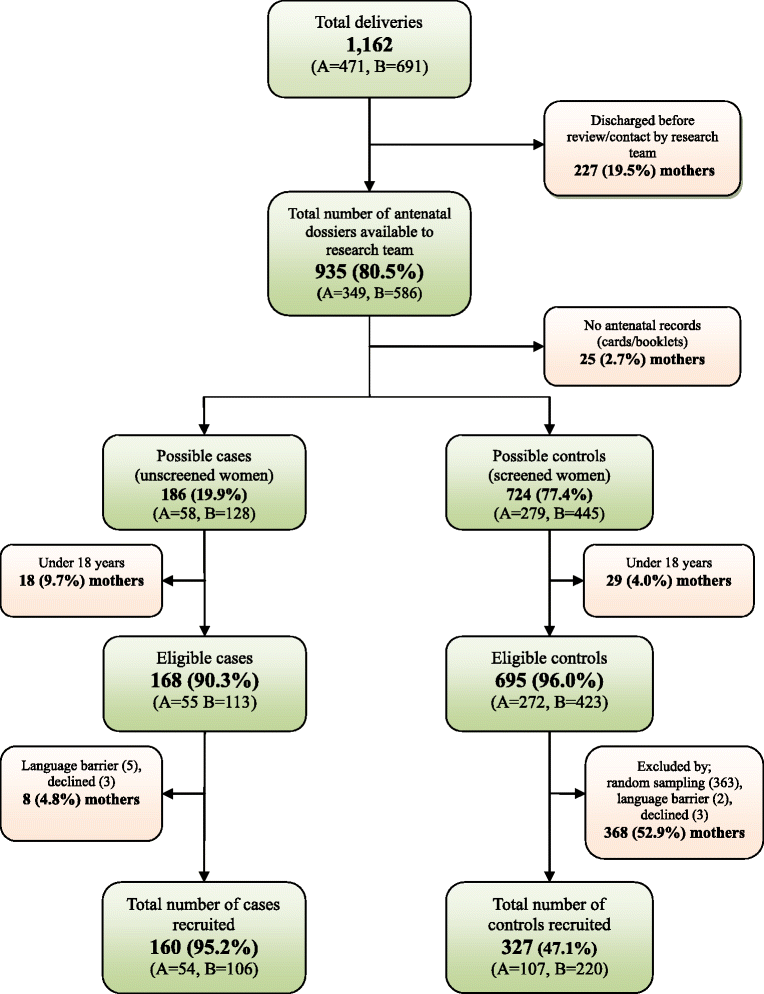Factors associated with failure to screen for syphilis during antenatal care in Ghana: a case control study
- PMID: 25888254
- PMCID: PMC4364573
- DOI: 10.1186/s12879-015-0868-1
Factors associated with failure to screen for syphilis during antenatal care in Ghana: a case control study
Abstract
Background: There is little data regarding the effect of ramping up new screening interventions on their uptake by target populations into routine care services in developing countries. This study aimed to determine patient-level factors associated with failure of pregnant women to get screened for syphilis during antenatal care, in the context of a national rollout of rapid syphilis point of care tests (POCTs) in Ghana.
Methods: An unmatched 1:2 case control study conducted among women admitted for delivery in two district hospitals in the Ashanti Region of Ghana from August to October 2010, 7 to 9 months after the introduction of POCTs in the region. Cases were women who had not been screened for syphilis during antenatal care and controls were women who had been screened. Patient-reported factors for being unscreened were examined using logistic regression to obtain odds ratios (ORs) and 95% confidence intervals (CIs).
Results: 160 consecutive unscreened and 327 screened women were recruited. Most women had good knowledge of syphilis (58.7% among unscreened women vs. 64.2% among screened; P=0.24). Factors associated with failure to get screened were: attending antenatal care in a private health facility (adjusted OR, 11.09; 95% CI 5.48-22.48), previous adverse pregnancy outcome (adjusted OR, 1.98; 95% CI 1.22-3.23) and not being screened for HIV during the current pregnancy (adjusted OR, 2.78; 95% CI 1.50-5.13). The odds of being unscreened also increased with decreasing doses of intermittent preventive treatment for malaria in pregnancy received (P trend<0.001) and decreasing education level (P trend=0.02).
Conclusion: Significant risk factors for not being screened, following the national rollout of syphilis POCTs, related to the type of health facility where antenatal care was received and some of the women's personal characteristics. Targeting of private medical facilities to include syphilis POCTs and support other neglected public health interventions should be a priority.
Figures
Similar articles
-
Rollout of rapid point of care tests for antenatal syphilis screening in Ghana: healthcare provider perspectives and experiences.BMC Health Serv Res. 2018 Feb 20;18(1):130. doi: 10.1186/s12913-018-2935-y. BMC Health Serv Res. 2018. PMID: 29458363 Free PMC article.
-
Estimating the uptake of maternal syphilis screening and other antenatal interventions before and after national rollout of syphilis point-of-care testing in Ghana.Int J Gynaecol Obstet. 2015 Jun;130 Suppl 1:S63-9. doi: 10.1016/j.ijgo.2015.04.013. Epub 2015 Apr 29. Int J Gynaecol Obstet. 2015. PMID: 25980367
-
Coverage of antenatal syphilis screening and predictors for not being screened in Ulaanbaatar, Mongolia.Sex Transm Dis. 2006 May;33(5):284-8. doi: 10.1097/01.olq.0000194577.71693.c7. Sex Transm Dis. 2006. PMID: 16641821
-
Barriers and facilitators to HIV and syphilis rapid diagnostic testing in antenatal care settings in low-income and middle-income countries: a systematic review.BMJ Glob Health. 2022 Nov;7(11):e009408. doi: 10.1136/bmjgh-2022-009408. BMJ Glob Health. 2022. PMID: 36319030 Free PMC article.
-
Update on Syphilis for Women's Health Nurses.Nurs Womens Health. 2020 Apr;24(2):127-133. doi: 10.1016/j.nwh.2020.01.009. Epub 2020 Feb 26. Nurs Womens Health. 2020. PMID: 32112726 Review.
Cited by
-
A model of prevention of mother-to-child transmission and health management team for improving adverse outcomes of pregnancy syphilis in Ningxia, China.BMC Infect Dis. 2024 Oct 10;24(1):1134. doi: 10.1186/s12879-024-10029-4. BMC Infect Dis. 2024. PMID: 39390378 Free PMC article.
-
Facilitators and barriers to point-of-care testing for sexually transmitted infections in low- and middle-income countries: a scoping review.BMC Infect Dis. 2022 Jun 20;22(1):561. doi: 10.1186/s12879-022-07534-9. BMC Infect Dis. 2022. PMID: 35725437 Free PMC article.
-
Introducing onsite antenatal syphilis screening in Burkina Faso: implementation and evaluation of a feasibility intervention tailored to a local context.BMC Health Serv Res. 2017 May 30;17(1):378. doi: 10.1186/s12913-017-2325-x. BMC Health Serv Res. 2017. PMID: 28558812 Free PMC article. Clinical Trial.
-
A review of the process of knowledge transfer and use of evidence in reproductive and child health in Ghana.Health Res Policy Syst. 2018 Aug 3;16(1):75. doi: 10.1186/s12961-018-0350-9. Health Res Policy Syst. 2018. PMID: 30075725 Free PMC article.
-
Risk Factors for Stillbirth among Pregnant Women Infected with Syphilis in the Zhejiang Province of China, 2010-2016.Can J Infect Dis Med Microbiol. 2021 Feb 2;2021:8877962. doi: 10.1155/2021/8877962. eCollection 2021. Can J Infect Dis Med Microbiol. 2021. PMID: 33603937 Free PMC article.
References
-
- Jafari Y, Peeling RW, Shivkumar S, Claessens C, Joseph L, Pai NP. Are Treponema pallidum specific rapid and point-of-care tests for syphilis accurate enough for screening in resource limited settings? Evidence from a meta-analysis. PLoS One. 2013;8(2):e54695. doi: 10.1371/journal.pone.0054695. - DOI - PMC - PubMed
-
- Tulloch O, Mayaud P, Adu-Sarkodie Y, Opoku BK, Lithur NO, Sickle E, et al. Using research to influence sexual and reproductive health practice and implementation in Sub-Saharan Africa: a case-study analysis. Health Res Policy Syst. 2011;9(Suppl 1):S10. doi: 10.1186/1478-4505-9-S1-S10. - DOI - PMC - PubMed
Publication types
MeSH terms
LinkOut - more resources
Full Text Sources
Other Literature Sources
Medical


